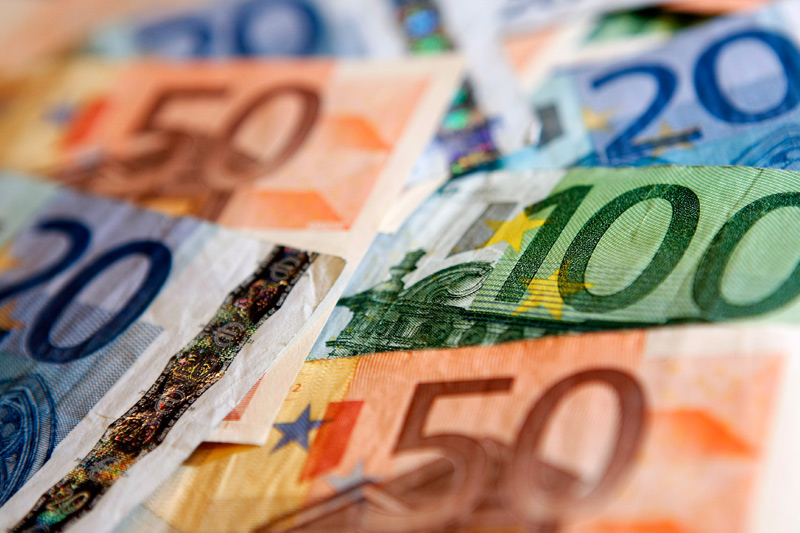Investing.com - The euro was lower against most of its major counterparts on Wednesday, as sentiment on the shared currency was hit by concerns over the health of Spain’s finances and renewed fears over Portugal.
During European late morning trade, the euro was lower against the U.S. dollar, with EUR/USD shedding 0.39% to hit 1.3075.
The euro remained under pressure ahead of a critical auction of two and 10-year Spanish government bonds on Thursday, amid uncertainty over whether the government will be able to reduce one of the euro zone’s largest budget deficits in the face of a looming recession.
Market sentiment was boosted after an auction of short-term Spanish government debt on Tuesday raised the full targeted amount of EUR3 billion, but the country’s borrowing costs almost doubled.
Meanwhile, concerns over Portugal’s economic health intensified after Prime Minister Pedro Passos Coelho said Wednesday there were "no guarantees" that the country would meet its commitment to return to the international capital markets before September 2013.
Elsewhere, the single currency tumbled to a 19-month low against sterling, with EUR/GBP falling 0.78% to hit 0.8179.
The pound was boosted after official data showed that the number of people claiming unemployment benefits in the U.K. rose less-than-expected last month, while the unemployment rate ticked down unexpectedly.
Meanwhile, the minutes of the Bank of England’s April meeting showed that just one policymaker voted in favor of additional monetary easing, after two of the nine member monetary policy committee favored additional stimulus in March.
But the euro was higher against the yen, with EUR/JPY rising 0.36% to hit 106.48.
The euro was little changed against the Swiss franc, with EUR/CHF inching up 0.07% to hit 1.2023.
In Switzerland, a report earlier showed that economic sentiment improved unexpectedly in April, turning positive for the first time since October.
The Centre for European Economic Research (ZEW) said its indicator of economic sentiment improved by 2.1 points to a reading of 2.1 in April, up from a flat reading in March. Analysts had expected a reading of minus 8.0 in April.
The shared currency was down against the Canadian, Australian and New Zealand dollars, with EUR/CAD shedding 0.40% to hit 1.2944, EUR/AUD slipping 0.21% to hit 1.2670 and EUR/NZD losing 0.11% to hit 1.5963.
Later in the day, the U.S. was to release official data on crude oil stockpiles.
During European late morning trade, the euro was lower against the U.S. dollar, with EUR/USD shedding 0.39% to hit 1.3075.
The euro remained under pressure ahead of a critical auction of two and 10-year Spanish government bonds on Thursday, amid uncertainty over whether the government will be able to reduce one of the euro zone’s largest budget deficits in the face of a looming recession.
Market sentiment was boosted after an auction of short-term Spanish government debt on Tuesday raised the full targeted amount of EUR3 billion, but the country’s borrowing costs almost doubled.
Meanwhile, concerns over Portugal’s economic health intensified after Prime Minister Pedro Passos Coelho said Wednesday there were "no guarantees" that the country would meet its commitment to return to the international capital markets before September 2013.
Elsewhere, the single currency tumbled to a 19-month low against sterling, with EUR/GBP falling 0.78% to hit 0.8179.
The pound was boosted after official data showed that the number of people claiming unemployment benefits in the U.K. rose less-than-expected last month, while the unemployment rate ticked down unexpectedly.
Meanwhile, the minutes of the Bank of England’s April meeting showed that just one policymaker voted in favor of additional monetary easing, after two of the nine member monetary policy committee favored additional stimulus in March.
But the euro was higher against the yen, with EUR/JPY rising 0.36% to hit 106.48.
The euro was little changed against the Swiss franc, with EUR/CHF inching up 0.07% to hit 1.2023.
In Switzerland, a report earlier showed that economic sentiment improved unexpectedly in April, turning positive for the first time since October.
The Centre for European Economic Research (ZEW) said its indicator of economic sentiment improved by 2.1 points to a reading of 2.1 in April, up from a flat reading in March. Analysts had expected a reading of minus 8.0 in April.
The shared currency was down against the Canadian, Australian and New Zealand dollars, with EUR/CAD shedding 0.40% to hit 1.2944, EUR/AUD slipping 0.21% to hit 1.2670 and EUR/NZD losing 0.11% to hit 1.5963.
Later in the day, the U.S. was to release official data on crude oil stockpiles.
